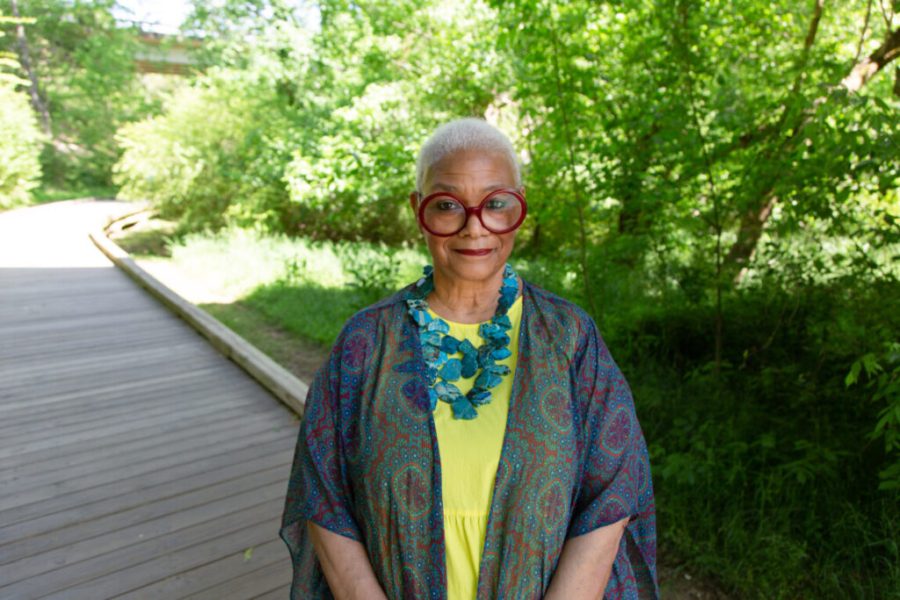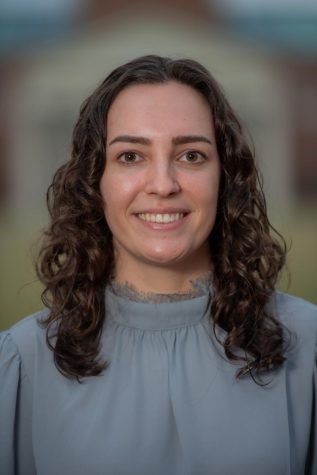English Department hosts NC poet laureate
Jaki Shelton Green — the first African-American poet laureate of the state — read her work aloud and participated in a student-only conversation event
October 10, 2022
Wake Forest welcomed North Carolina Poet Laureate Jaki Shelton Green to campus for a poetry reading and book signing as part of the Edwin G. Wilson Speaker Series on Sept. 29.
The event, made possible by the Wake Forest Department of English, the ZSR Library and the Finley Foundation, took place in the Porter Byrum Welcome Center.
The North Carolina native published her first poetry collection in 1977 and has since published seven additional collections, not including her most recent audio collection of spoken poems, “The River Speaks of Thirst”. She is the first African American and third woman to become the North Carolina poet laureate and has received many honors and awards including the North Carolina Award for Literature in 2003, the Light of Unity Award in 2019 and is the North Carolina Museum of Art’s 2022 Poet in Residence.
Green’s poetic career began as a young girl when she heard the story of her ancestor’s condemnation for being taught to read and write as a slave.
“My foremothers were enslaved women who had voices, but their voices were harnessed,” Green said in a one-on-one interview before the event. “They were held captive. So just this notion of having a voice… and helping people to understand the value, the importance and the power of all of our stories.”
The poet’s work is what is considered documentary poetry, a type of narrative writing that is situated within history to communicate a story. This became evident through Green’s reading on Thursday night. Green was able to read whichever poems she pleased, and her selections consisted of works narrating the relationship between Mary Todd Lincoln and her seamstress, Elizabeth Keckley, and that of Green’s ancestors.
A senior at Wake Forest, Joe Cho, attended the event due to his own love of poetry and expressed his opinion about the poet’s style.
“I like the language, her way of embellishing words, embellishing ideas and concepts,” Cho said. “But documentary poetry is not really something I like in poems. It’s more like a creative nonfiction, like more of a portrait than a poem for me.”
Poetry professor Laura Mullen, one of the forces behind Green’s coming to Wake Forest, spoke of the importance of Green’s documentary poetry.
“The ability of poets to take us time traveling in that way builds the possibility of resilience, the recognition of our shared humanity and is a pivot point for the best kind of transformational understanding,” Mullen said.
This positive relationship between people is something Green tries to achieve in her work.
“When you’re on a dance floor, getting your boogie on and you look across the room, and there’s a total stranger on the other side of the room and you’re staring at each other and you’re giggling… it’s the language of what you’re feeling in that moment,” Green said in an interview. “You don’t have to know each other to have the same appreciation and experience for the art of the music.”
This includes bridging the gap between young and old, which is why Green also attended a conversational event earlier on Thursday, an Interactive Dialogue with Jaki Shelton Green, in which students could ask questions pertaining to her life and career.
Events like Green’s poetry reading and student conversation are not too common, but more can be found in the future as part of various series and department-led events.
Katie Wooten, a student in the Master’s Program in English at Wake Forest, shared her view on the experience of poetry reading.
“I think any time you have the opportunity to hear a creative writer talk about their work, you should absolutely take advantage of it,” Wooten said. “I think you should get the poet’s voice in the room as much as possible, so I appreciated hearing her words in her own voice.”















